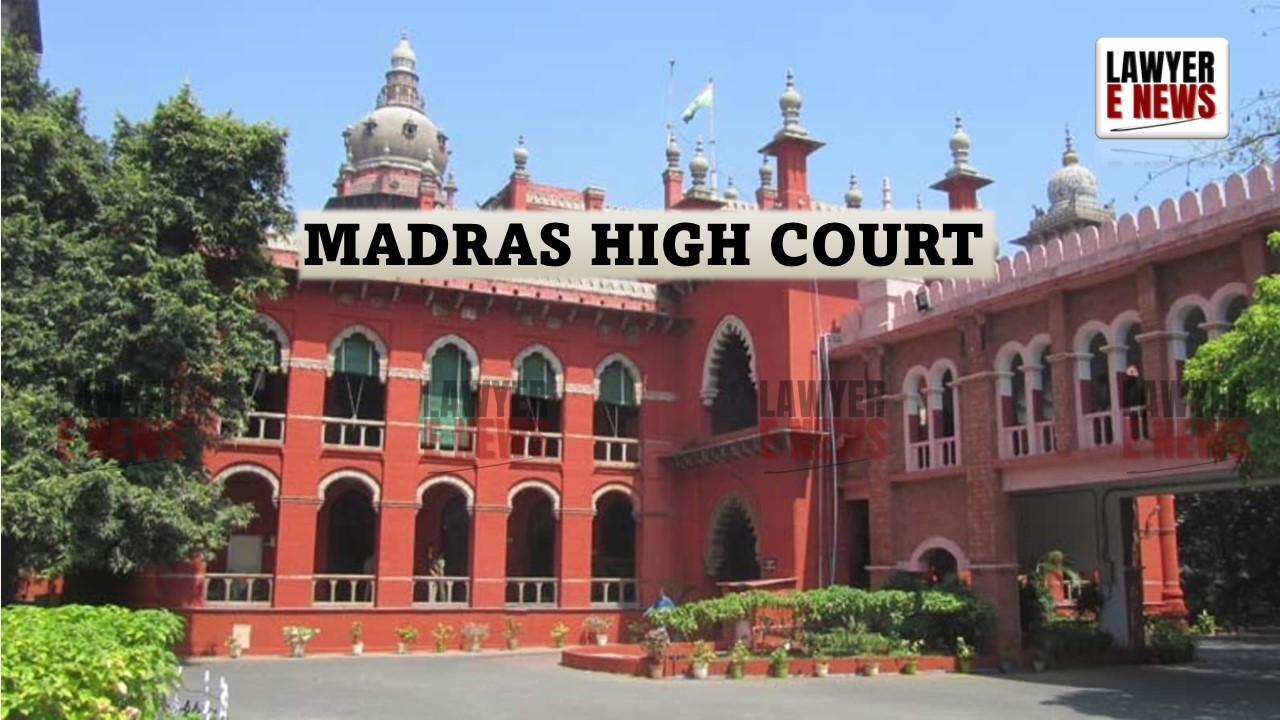-
by sayum
16 February 2026 8:46 AM



In a significant ruling, the Madras High Court has held that denying maternity leave to a woman solely because she is pregnant with her third child is arbitrary and legally unsustainable if she has not previously availed such leave.
Delivering judgment in C. Kohila v. The Additional Chief Secretary, Health and Family Welfare Department & Ors., Justice R. Vijayakumar ruled that maternity leave must be considered based on service tenure rather than the biological order of childbirth. The Court emphasized that the right to maternity leave cannot be mechanically denied based on Rule 101(a) of the Fundamental Rules when it has not been previously availed.
"The legislative intent behind maternity leave provisions is to ensure the health and well-being of working mothers. Denying maternity leave in a manner that disregards the actual service history of an employee would amount to an unfair and unreasonable application of the law," the Court observed.
The Court directed the Government Rajaji Hospital, Madurai, to grant the petitioner maternity leave for 365 days as per Rule 101(a) of the Fundamental Rules within 12 weeks.
"Rule on Two-Child Limit Must Be Interpreted Purposively, Not Rigidly"
The petitioner, C. Kohila, a staff nurse at Government Rajaji Hospital, Madurai, was denied maternity leave for her third pregnancy on the ground that she already had two surviving children from her first marriage. The hospital authorities cited Rule 101(a) of the Fundamental Rules, which states that maternity leave can only be granted to a government employee with less than two surviving children.
However, the petitioner argued that she had never availed maternity leave for her first two children because she was employed on a contractual basis at that time. It was only after her permanent appointment in 2018 that she became eligible for full maternity benefits.
The High Court rejected the government’s contention, ruling that a rigid application of Rule 101(a) would violate the intent of the law.
"The purpose of limiting maternity leave to two children is to encourage population control and prevent financial strain on the state. However, this rule should not be interpreted in a way that unfairly deprives a woman of maternity benefits that she has never used," the Court noted.
The Court relied on the Supreme Court’s ruling in Deepika Singh v. Central Administrative Tribunal, (2023) 13 SCC 681, which had held that maternity leave should be granted twice in a woman's service tenure, irrespective of the sequence of childbirth.
"Maternity leave is a right that ensures the well-being of the mother and child. If a woman has not previously availed this benefit, she cannot be deprived of it merely due to a technical reading of the rule," the Court ruled.
"Denial of Medical Leave by Hospital Board Was Arbitrary and Unfair"
After her maternity leave application was rejected on August 30, 2024, the petitioner applied for alternative medical leave, requesting:
• 90 days medical leave
• 169 days earned leave on medical certificate
• 106 days leave on loss of pay on medical certificate
However, the hospital authorities did not process her request and instead referred her to the Medical Board. The Board then declared her fit for duty on September 24, 2024—just five days before her expected delivery date.
Criticizing the arbitrary decision of the Medical Board, the High Court observed:
"It is shocking that a medical board would certify a woman as fit for duty just five days before childbirth. Such a decision lacks any medical justification and is an abuse of discretion."
The Court ruled that the Medical Board’s actions violated principles of fairness and natural justice and directed that maternity leave be granted immediately.
"Maternity Leave Must Be Considered a Fundamental Right for Working Women"
The High Court reiterated that maternity leave is not a privilege but a fundamental right that safeguards the dignity, health, and employment security of women.
Citing precedents from the Kerala High Court and Bombay High Court, the Court ruled that denying maternity leave simply because the third pregnancy resulted from a second marriage is discriminatory.
"A woman’s right to maternity leave cannot be denied simply because she has remarried. Every childbirth must be treated independently when considering maternity benefits," the Court held.
Referring to Airports Authority of India Workers Union v. Under Secretary, Ministry of Labour, Bombay High Court, 10.05.2024, the Court reaffirmed that maternity benefits should be granted twice during an employee’s service period, irrespective of her marital history.
"State Cannot Mechanically Deny Maternity Leave Based on Technicalities"
The High Court set aside the impugned orders of the hospital authorities and directed them to grant full maternity leave to the petitioner.
"The government must adopt a purposive and welfare-oriented approach when interpreting maternity benefits. A rigid and mechanical application of rules would defeat the very purpose of these provisions," the Court emphasized.
The judgment ensures that government employees who have not previously availed maternity leave will not be unfairly deprived of their rights, even if they have more than two children.
"Government Directed to Implement Judgment Within 12 Weeks"
The Court allowed the writ petition and ordered the hospital authorities to process the petitioner’s maternity leave application within 12 weeks.
"The respondents are directed to grant the petitioner maternity leave for 365 days in accordance with Rule 101(a) of the Fundamental Rules, without any further delay," the Court ordered.
The ruling marks an important victory for working women in government service and reinforces the legal protections surrounding maternity benefits.
This progressive interpretation of maternity leave laws will serve as a precedent for cases where women are unfairly denied maternity benefits due to technicalities.
Date of Decision: 21 January 2025
